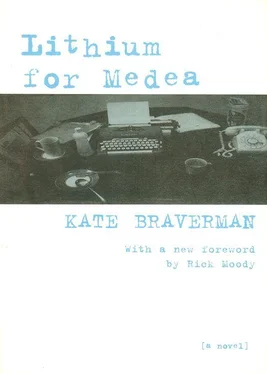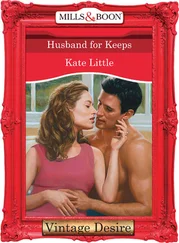I reached out for her but she hopped past me, hopped to the cardboard boxes I had brought with me. She grabbed a glass-framed poster from a painting exhibit in Rome and hurled it against the wall. It shattered.
“You wouldn’t go into the world,” Francine cried. “So I tried to bring the world to you.”
A hand-painted vase from Barcelona broke. A delicate statue of a little girl combing her hair hit the wall. Decapitated.
Then as suddenly as it began, it stopped. Francine fell to the floor. She put her head into the crook of her left arm, the arm that can still bend, and wept, sobbed, her shoulders shaking. I wrapped a towel around the gash in her foot. I patted her head gently. “It’s O.K., baby,” I said over and over. “It’s going to be O.K., baby.” Her hair looked red in the lamplight. After a long time she lifted her head.
“I’ve made mistakes,” Francine began. “Monumental mistakes. I was just reading the Harlow experiments. The deprived monkeys. They gave them surrogate wire mothers. Just like foster parents. And when the monkeys reached maturity they couldn’t function.” Francine looked at me with wide orbs of yellow eyes. “Do you think the Harlow experiments would have a wide popular appeal?”
I thought about it. I said no.
I helped my mother weave a path through the glass splinters back to the den. She finished her Scotch and poured another. I finished mine and poured another. I looked at the cut on her foot. I put a piece of gauze and adhesive tape around it.
“I broke my arm when I was six. It was the year after the dog bit off a mouthful of my thigh. I slipped on ice and they wouldn’t take me to get it set. My arm doesn’t bend. That’s why I’m such a shitty tennis player,” Francine said.
My mother finished her drink. I finished mine. I poured us both another.
“Remember when we snuck down the stairs in Philadelphia and I showed you the first snow of the year, before it got damaged?”
“I remember. It was beautiful. We drank hot chocolate.”
“Chivas is better.”
“Yes.”
“You’ve never spent the night here before,” Francine said. She seemed to search the air for something. “Are you really leaving Jason?”
“Yes.”
“Good. Are you going to see your father first? Make sure the throat job works?”
“Yes,” I said. “But I know it will work.”
“You think I’m looking for a man?” Francine suddenly asked. She seemed to be evaluating a pinkish slice of shadow near the light creamy wall. “I’m not. I know everything about men. I’ve known since I was eleven.” Francine took a sip of Scotch. “I’m not looking for a man. I just try to keep busy. I keep punching. The bell rings and I get back in the ring swinging. I’m punchdrunk. But I’m not expecting anything from a man.” Francine smiled. Her eyes looked lit from the inside the way they had when she told me she knew all along that the mice were in her room, in the sewing machine and ceiling. “Men always break in the end,” Francine said. She was staring at me. “May I comb your hair? Like when you were a little girl and we used to play together all day?”
I said yes. My mother found a hairbrush. She hopped over to me. She knelt on the floor and began brushing my long tangled hair.
“I used to brush your hair when you were little,” my mother told me. She brought her face very close to mine. “I put ribbons in your hair. I had a drawer of different-colored ribbons. I liked to make your ribbons and socks match.”
I thanked my mother for combing my hair then, when I was an infant and when I was a girl, and now. Terminal now. Outside the night was deep, a solid black without a trace of dawn in it.
“You don’t leave a mother in the middle of the night,” Francine said. “That’s how I left the foster homes. Just disappeared. But you don’t leave a real mother that way. Not a mother who put the right-colored ribbons in your hair. You don’t leave a real mother in the middle of the night, do you?”
I said no. I finished my Scotch. Francine poured me another. The gash on her foot had stopped bleeding. “I can’t go on,” I said finally.
“I know. I’m exactly the same as you. There are no boundaries between us. It’s just that I’ve gone through it more often.” She was looking at the arc of pink light pushing into the night.
“Inside I’m unchanged. Your father loved me once. You loved me once. But despite it all, the core of who and what I am remains unchanged. The only time I was allowed in a kitchen was to clean it. If I wanted a glass of water I had to go to the bathroom and I was afraid of the men, the fathers, the uncles sleeping over drunk.” Francine looked at me. What was she looking for? She refilled our glasses.
“Every time I went to a new foster home I changed my identity. You never knew when they were coming for you. A social worker would just appear and you’d pack your suitcase and be driven to a new foster home, a new school. I would pretend I had just arrived from Wyoming. Can you imagine? Wyoming?” Francine laughed. She touched my arm with her hand.
“Your father said I was too damaged to have a child. He was wrong, wasn’t he?”
“Yes, Mommy.” I held her hand. “He was wrong. Remember the robin building his nest in the rain?”
“Are you really going?”
“Yes.”
“Maybe we can be adult about this,” Francine began. “Don’t you think leaving like this is merely a regression? A flight into fantasy? The romanticized childhood and idealized past?”
“Hardly.”
Francine started to stand up. She remembered the cut on her foot. “It’s been done, kid,” she said. “The Woodstock trip is passé. The journey to the east, to the south. It’s a standard convention, a cliché.”
“That’s irrelevant,” I said.
“It’s wall-to-wall redneck out there. The bathrooms are unclean. You won’t like it,” Francine assured me.
“I’m going beyond that,” I told my mother, “into something greater. I am going to go the distance.”
There was a long silence between us. A lonely wet robin built a nest in a low branch. We watched him struggle. Snow fell in an arc of lamplight, perfect, unmarked. A pansy was pressed between the pages of a book. A purplish imprint across the title page. A moment severed out of time and preserved.
“Go the distance?” Francine said finally. “I like that. I’ve been waiting for you to wake up. Connect. Open your eyes. Reach out your arms for something that matters. Only a fool stays at the same losing table. Get a new deck, a new game. Just go. Go while you’ve got momentum. There were doors I stood at,” my mother whispered. “Train terminals. Corners. A few steps in either direction and your whole life is different. I could have been someone.”
“You are someone.”
Francine laughed. “I mean someone good.”
“You are good, Mother.”
“I fucked up bad.”
“So did I.”
“But you can do it over. You still have a chance,” my mother said, her eyes large and glowing, pulsing with something. “I know.”
After a while Francine said, “Tell me about my mother.”
I told her. The night grayed. Spokes of dawn shoved through and night was a pair of charcoal wings parting. My mother and I sat together on her brick terrace and waited for the sun. The air began to sting.
“You better go,” my mother said. Her voice was small, the voice of a little girl.
“I’m afraid,” I said.
“There’s nothing to be afraid of. There’s nothing but mediocrity out there. It’s a six-thousand-dollar claimer. Our father taught us that.”
We were standing near her front door. The splinters of glass glistened in the early morning sunlight. Birds chirped. My mother tried to smile. Her lips twitched. It looked as if pieces of her skin were crumbling, falling off in big white blocks.
Читать дальше












